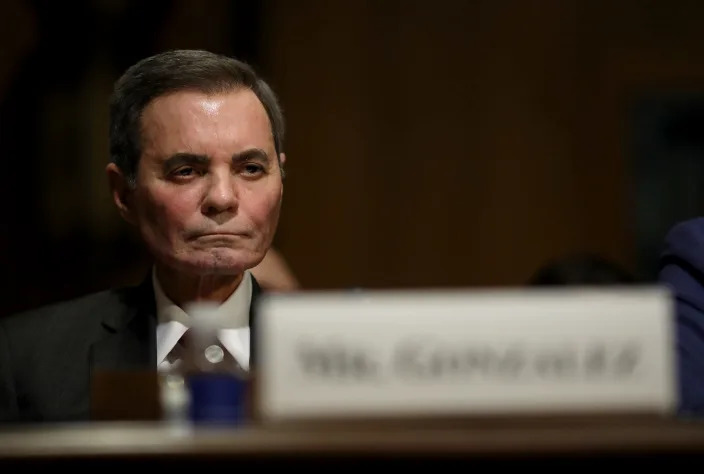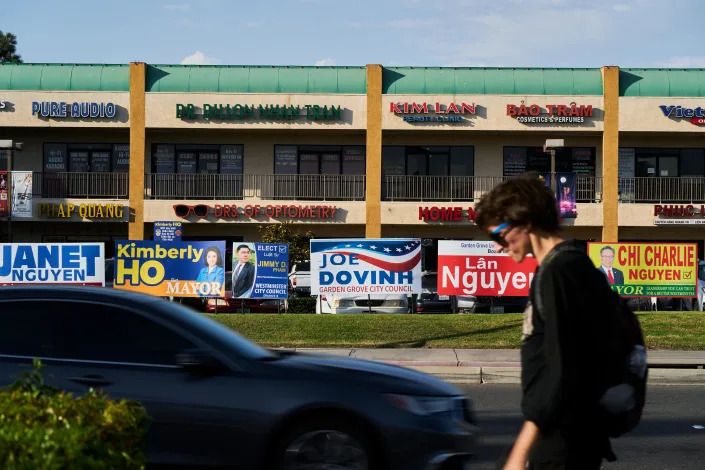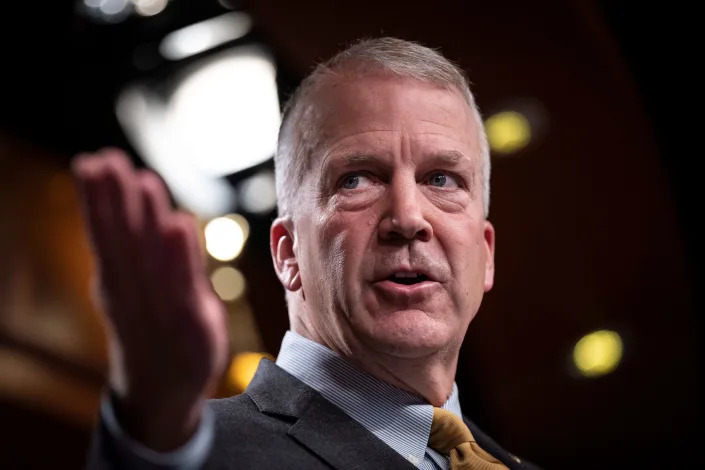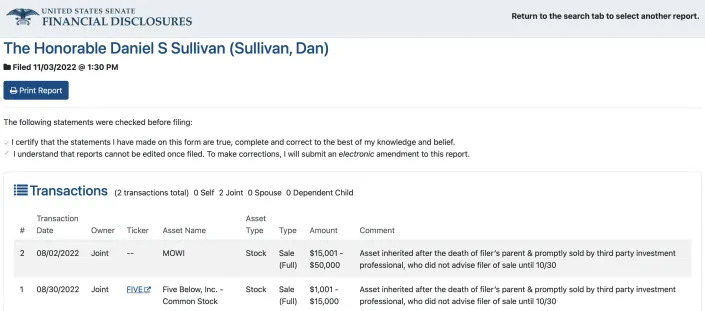
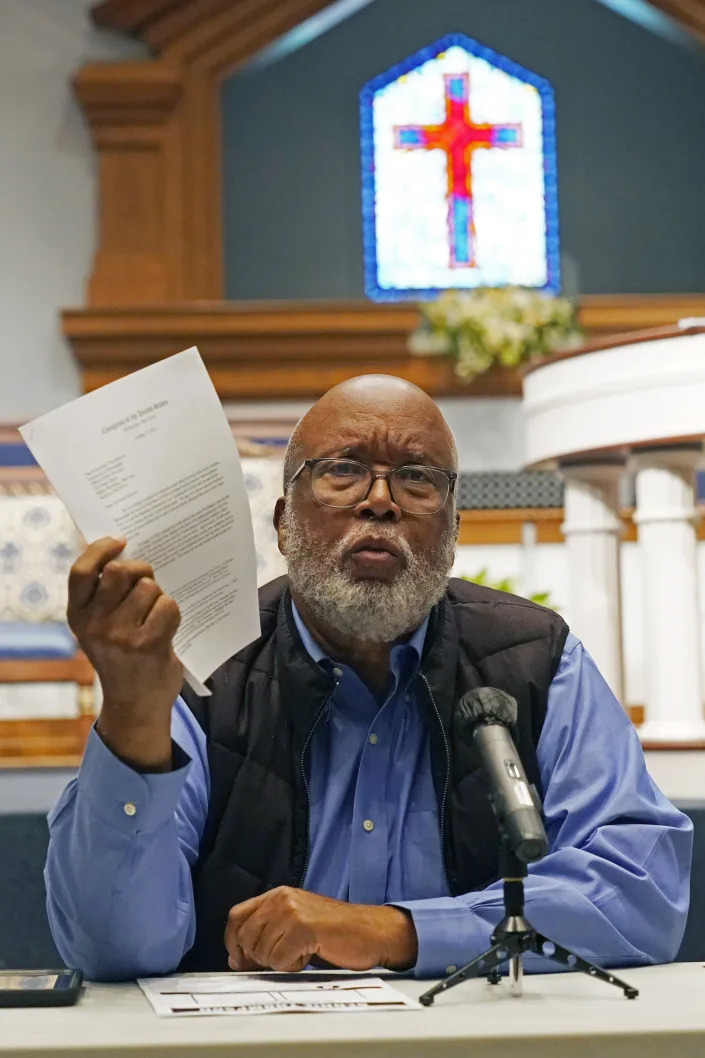
U.S. Rep. Bennie Thompson, D-Miss., displays a letter to Mississippi Gov. Tate Reeves that expresses concern over what he believes is the inadequate federal funding from the American Rescue Plan Act and the Bipartisan Infrastructure Law to address the failing water system in Mississippi's majority-Black capital city, Jackson, Miss., on Monday, Oct. 24, 2022, at a town hall meeting hosted by the NAACP. Reeves responded Monday, Nov. 7, to a congressional probe into the crisis that left 150,000 people in the state's capital city without running water for several days in late summer.
MICHAEL GOLDBERG AND EMILY WAGSTER PETTUS
Mon, November 7, 2022 at 5:34 PM·4 min read
JACKSON, Miss (AP) — Mississippi Gov. Tate Reeves Monday released his response to a congressional investigation of the crisis that left 150,000 people in the state's capital city without running water for several days in late summer.
Reeves said Jackson has received a disproportionate amount of funding for its water system based on the city's size. He also said local officials only have themselves to blame for the water woes.
“(M)y administration is deeply committed to ensuring that all federal funds received by Mississippi for drinking water systems upgrades have been in the past and will continue to be in the future made available and distributed among Mississippi’s more than 1,100 water systems on an objective and race-neutral basis,” Republican Reeves said in a letter dated Oct. 31 and addressed to Reps. Bennie Thompson of Mississippi and Carolyn Maloney of New York.
The two Democrats sent Reeves an Oct. 17 letter requesting details of where Mississippi sent money from the American Rescue Plan Act and the Bipartisan Infrastructure Law, including “the racial demographics and population sizes of each” community that received aid. They also requested information on whether Jackson, which is 80% Black, has faced “burdensome hurdles” to receive additional federal funds.
Comparing census data against the recipients of state water loans, Reeves wrote “there is no factual basis whatsoever to suggest that there has been an ‘underinvestment’ in the city or that it has received disproportionately less than any other area of the state.” In 2021, Jackson accounted for 68% of all loans dispersed, Reeves wrote.
Mississippi received about $1.8 billion in ARPA money, and the Legislature put $750 million of that toward competitive grants for Mississippi’s water systems. Officials announced last week that they approved Jackson’s request for $35.6 million in federal funds to help pay for seven water and sewer projects.
Thompson and Maloney said in a joint statement Monday that recent federal aid to Jackson can be traced to more federal involvement. They said they received the governor's letter Monday.
“The Governor’s response to our letter is a clear acknowledgment that the City of Jackson, and its water systems, are in desperate need of resources to supply clear water to the city’s residents," Thompson and Maloney said. “Democrats have passed infrastructure funding for this exact purpose, and the Biden Administration has orders in place to maximize the delivery of these resources to communities of greatest need — including Jackson — to overcome generational disinvestment in communities of color from every level of government.”
They also pointed to an ongoing EPA civil rights investigation into whether Mississippi state agencies discriminated against Jackson in the distribution of water infrastructure funds.
Reeves wrote that Jackson tax collections increased from 2003 to 2020, but numbers cited by the governor did not account for the decreased buying power because of inflation. Reeves wrote that Jackson’s property tax collections were about $60 million in 2003 and $79 million in 2020. An inflation calculator shows that $60 million in 2003 would be worth about $84 million in 2020 — so, although the numbers were up, the buying power was down.
Reeves also wrote that Jackson sales tax collections increased during those years, but he did not mention that part of the increase was because Jackson residents voted in 2014 to approve an additional 1% sales tax to help pay for infrastructure improvements.
"Enforcement efforts” against Jackson by federal regulators are proof of city mismanagement, he said. The Environmental Protection Agency issued a notice in January that Jackson’s water system violated the federal Safe Drinking Water Act.
In September, federal attorneys threatened legal action if the city did not agree to negotiations related to its water system. Jackson Mayor Chokwe Antar Lumumba said last week that negotiations are continuing. While the EPA said current samples indicate Jackson’s water quality meets federal standards, testing continues and legal action against the city is still a possibility.
Through a spokesperson, Lumumba declined to comment on the governor's letter Monday.
Jackson has had water problems for years, and the latest troubles began in late August after heavy rainfall exacerbated problems in the main treatment plant, leaving many customers without running water. Jackson had already been under a boil-water notice since late July because the state health department found cloudy water that could make people ill.
Reeves said the city has been unable to run its billing system and hire enough skilled personnel to manage the system.
Running water was restored within days, and a boil-water notice was lifted in mid-September, but Thompson and Maloney's letter to Reeves said “water plant infrastructure in the city remains precarious, and risks to Jackson’s residents persist.”
Thompson and Maloney said their letter marked “the start of a joint investigation” by the House Homeland Security and the Oversight and Reform committees into the water crisis. If Democrats lose their majority in the midterm elections, it is unlikely the probe would continue without bipartisan interest.
Michael Goldberg is a corps member for the Associated Press/Report for America Statehouse News Initiative. Report for America is a nonprofit national service program that places journalists in local newsrooms to report on undercovered issues. Follow him on Twitter at twitter.com/mikergoldberg. Follow Emily Wagster Pettus on Twitter at http://twitter.com/EWagsterPettus.

